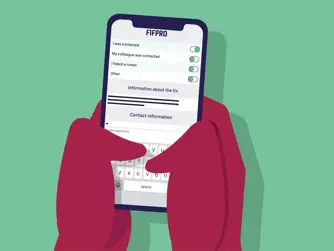News
Footballers Unfiltered: The player banned for two years despite bringing match-fixers to justice

- FIFPRO’s Footballers Unfiltered, hosted by Joe Hart, enables current and former footballers to have open conversations about the rarely seen side of the profession
- The second episode of the monthly series sees Hart joined by former Malta international Samir Arab and FIFPRO Legal Director Roy Vermeer
- Despite refusing to fix a match and cooperating with police to bring criminals to justice, Arab was hit with a two-year ban by football authorities
A player who was approached to manipulate a U-21 UEFA European Championship qualifier in return for money – and who received a two-year ban despite ignoring the approach, cooperating with the police, and later giving evidence in court – has shared his story on the latest instalment of Footballers Unfiltered.
Maltese international Samir Arab joined host Joe Hart and FIFPRO Legal Director Roy Vermeer for the second episode of Footballers Unfiltered, a monthly series where current and former players have open conversations about the rarely seen side of football. The first episode, released last month, featured Juventus and Italy legend Giorgio Chiellini on how going to university sharpened his mind on and off the pitch.
In 2016, a former team-mate of Arab’s met him in a café and tried to convince the defender to manipulate a Malta U-21 game by losing each half by one goal in return for thousands of euros. Arab refused – the game finished 1-0 and Arab was praised by his coach for his performance – and he later cooperated with police investigations, despite fearing repercussions from criminal gangs, which led to court convictions for the perpetrators.
"I remember being in front of the investigator. I asked if I could testify anonymously in court and he told me no," said Arab. "No-one could guarantee my safety.
"The initial person that approached me [to fix a match] testified in court that I rejected the approach. Without me, the court couldn't give the sentence they wanted to."
Arab continued: "Pointing at him [in court] puts [the player] in an uncomfortable position. Today I have no problem speaking about it, but God knows what I may have done to myself or how I may have reacted if things didn't go my way, for example, if I was sentenced. Suicidal thoughts come to your mind, so does leaving the country."
Despite bravely testifying, Arab was hit with a two-year ban by football authorities as he did not immediately inform them about the match-fixing approach.
"I would have reported anonymously for sure, pointing out details that may help an investigation to start when I was approached first. It would have been much easier to give details without exposing myself," said Arab.
To protect players in this position, FIFPRO launched the Red Button app in 2020, which allows footballers to report match-fixing approaches safely and anonymously to law enforcement and authorities in their country.
"I advocated for the Red Button app together with FIFPRO," said Arab. "I was quite happy with it because associations like FIFPRO, even the Malta Football Players Association, were of great help and it's crucial for players to have associations that protect their rights and care about them."
Explained: The Red Button

The truth about match-fixing in football
Football is one of the most targeted sports by international organised crime, according to Europol. Those engaging in this criminal behaviour will often exploit players who are in financial difficulties, such as those not regularly receiving their salary.
"Football governing bodies need to make sure they don't put players in vulnerable positions – and what I mean by that is getting paid at the right time," said Arab. "If a person has a family with two, three kids, not getting paid for six months, and then we put them in this position where they need their bread and butter, we are making it easier for these match-fixers to find people to do it."
A FIFPRO study amongst 13,000 professional footballers in 2016 found that 40 percent of those players reported none or delayed payments of salaries, highlighting how the system is systematically failing players. It in turn provides a terrain for criminals to exploit footballers in financial difficulties, such as those not regularly receiving salaries from clubs.
"There is quite a big problem with match-fixing in football. We did some studies a while ago and, for example, in Malta, around 15 percent of players had been approached," said FIFPRO Legal Director Roy Vermeer.

"We also had an experience with a Croatian player who hadn't been paid for five months. A match-fixer approached him, he accepted it, and he said, ‘As soon as I accepted it, I was in’. If you do it once, then the match fixers know, ‘Well, you're going to do it again because we are going to out you if you don't do it again’.
"Football bodies have an obligation to ensure players are as least vulnerable as possible and that means players being paid on time, perhaps also rethinking why certain games are being even offered on the betting market."
With emerging betting markets, the risk of manipulation is higher than ever. According to research from FIFPRO, one in 10 players during their career will be approached.
"It can happen to any player but I'm happy that Samir at the end of the day turned it into something positive. How we can avoid this all together is better education and also a safe reporting tool for all involved.
"We also need to ensure sports governing bodies understand the specifics of each case. So, they cannot just put a blanket rule in place and therefore think that everything falls under that. You need to have a case-by-case specific analysis."
Footballers Unfiltered is a 12-episode monthly series celebrating FIFPRO’s 60th year of serving players. All episodes can be accessed HERE.
